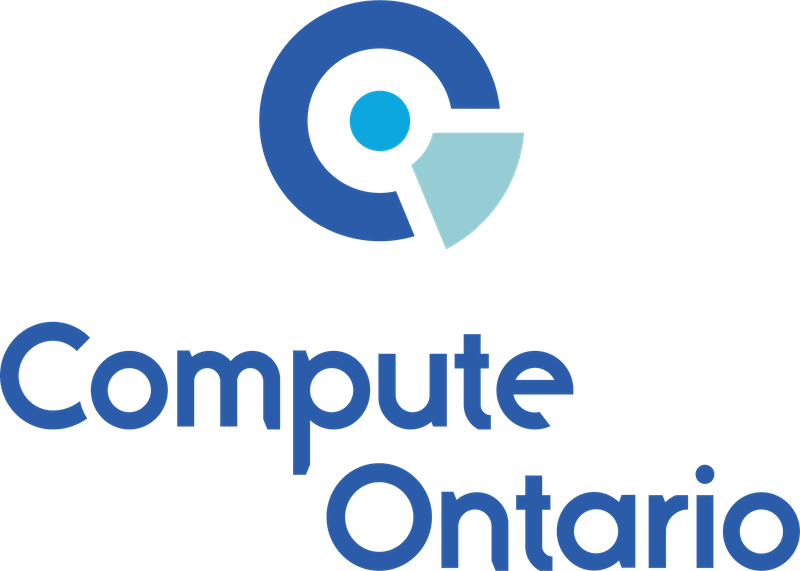Advancing research, innovation and creation in Ontario
Compute Ontario (CO) works with the Ministry of Colleges, Universities, Research Excellence and Security (MCURES) to plan, secure and oversee provincial investments in DRI and bring strategic alignment to the activities of provincially funded DRI providers. On behalf of the province, we collaborate with partners in the broader provincial and national DRI ecosystems to coordinate funding, skill development, and operations. Our goal is to ensure that Ontario researchers and their industry partners have access to crucial digital resources to achieve their research and creation goals, within a thriving DRI ecosystem that is sustainably funded and technologically sound.
What is DRI?
Digital Research Infrastructure (DRI) is the ecosystem of compute and data storage, high speed networks, experts and software that powers artificial intelligence, advanced research and high-tech industry. DRI-based research is being applied in every field, from the design of next-generation materials and cancer treatments to film and media creation, curation and preservation. DRI-based research fuels profitable academic-industry joint ventures, innovative tech start-ups and the transformation of sectors such as mining and manufacturing — creating significant economic benefit and building/attracting expert talent to the province.
Ontario’s DRI is funded by the provincial and federal governments, with contributions from Ontario universities. Services in Ontario are delivered by four consortia of academic and health institutions.
News and Announcements
UPDATE - DEADLINE EXTENDED TO NOV. 6, 2025
Annual Funding Call launches today!
OCTOBER 6, 2025 Today Compute Ontario released the annual Call for Proposals to develop self-paced training materials related to DRI (advanced research computing, research data management and research software). This year we are proud to partner with Ontario Brain Institute to present this funding opportunity. Compute Ontario and OBI’s Centre for Analytics have committed a total of $100,000, with the vision of supporting up to four projects to be completed by March 31, 2026. Projects can request up to $25,000 for eligible expenses. We envision funding at least one proposal that is focused on computational neuroscience training materials, such as neuroanalytics and modelling. The deadline for submissions is October 30, 2025 at 5 p.m.
New self-paced DRI training resources are available!
JULY 2, 2025 Compute Ontario is pleased to share that new open-access, self-paced training materials are available to build core knowledge and skills for researchers wishing to use high-performance computing, AI and ML. These materials have been developed by collaborative teams of experts across the province, with the help of funding provided by Compute Ontario through a call for proposals issued in 2024. CO awarded just over $200,000 through the 2024 funding call, to support skills development for Ontario researchers, students and research support staff. Congratulations to the project teams who produced these valuable and easily accessible resources!
Compute Ontario Awards $200K to Create Self-Paced DRI Training Resources
JANUARY 7, 2025 Compute Ontario is pleased to announce that five teams will receive funding support for projects to create asynchronous (self-paced) DRI training materials. The projects will develop training modules and resources focused on core knowledge/skills for researchers wishing to use high-performance computing, AI and machine learning methods. A total of just over $200,000 has been allocated to projects being undertaken by teams at Carleton University, McMaster University, University of Ottawa, University of Toronto (SciNet) and a team led by Ontario Institute for Cancer Research in collaboration with Canadian Bioinformatics Workshops and McGill University.
New DRI Training Resources Available
AUGUST 21, 2024
The DRI community has created a series of new open educational resources to support researchers, students and those in research support roles. These courses offer a range of learning opportunities in the areas of research software (RS) stewardship, research data management (RDM) and artificial intelligence:
Advanced Research Computing for Computational Fluid Dynamics (ARC4CFD) is an introductory course created by the University of Waterloo and intended for researchers with basic knowledge of fluid dynamics/computational fluid dynamics.
Conestoga College led an inter-college team in creating Research Data Management in the College and Small Institution Context: four education modules which introduce intermediate RDM concepts to researchers and College/University staff who work in research support roles. These materials are available in English and French for institutions to use or repurpose.
The Data Repository Primer and Data Repository Navigator, developed by Toronto Metropolitan University, are designed to help researchers in all contexts to understand best practices in RDM and data deposit, and to select an appropriate data repository for their research.
University of Ottawa Heart Institute has created a set of 4 Data Management Plan templates for specific biomedical research designs (trials, reviews, preclinical research, genomics data) and a draft consent template that can be used by researchers to set their data up for open or restricted access sharing.
The Machine Learning Tutorial Series, put together by a team from University of Ottawa, includes four modules designed to provide a structured learning experience, combining theoretical explanations with hands-on exercises to reinforce understanding, using real datasets from open resources. Additional modules are forthcoming.
McMaster University has released Stewarding Research Software from Proposal to Deposit and Publication to help researchers and students understand FAIR principles, develop a software management plan, choose technical/coding strategies to enhance reproducibility and build a computing site using Minima.
Compute Ontario is pleased to have contributed funding toward these projects, as part of our mandate to ensure researchers and students have access to training in the core skills required for successful digitally enabled research.




